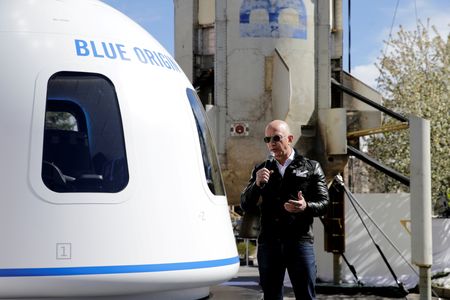
By Joey Roulette
WASHINGTON (Reuters) -A Blue Origin capsule carrying cargo toward the edge of space aborted from its New Shepard rocket booster on Monday shortly after liftoff from Texas, escaping what appeared to be a malfunction near the rocket’s engine section, a company livestream showed.
No humans were on board the capsule, which sat atop the company’s suborbital New Shepard rocket loaded with NASA-funded research payloads and other cargo that were expected to float in microgravity for a few minutes some 62 miles (99.78 km) above ground.
But a minute after liftoff and roughly 5 miles above ground, the New Shepard booster’s engines flared, triggering the capsule’s abort motor system that jetted the spacecraft away from its rocket before parachuting back to land intact.
“We’re responding to an issue this morning at our Launch Site One location in West Texas,” Blue Origin tweeted, adding that the capsule’s abort system “functioned as designed.”
The flight was the 23rd New Shepard mission by Blue Origin, the space company of billionaire Jeff Bezos, founder of Amazon.com Inc.
The U.S. Federal Aviation Administration, which licenses rocket launches and regulates launchsite safety, said it would oversee Blue Origin’s investigation into the rocket mishap and examine the company’s findings before allowing New Shepard to return to flight.
The FAA said there were no reports of injuries or damage to public property. The failed rocket booster, from which Blue Origin’s livestream cut away to focus on the aborted capsule, “impacted within the designated hazard area,” the FAA added.
(Reporting by Joey Roulette in WashingtonEditing by Chizu Nomiyama and Matthew Lewis)

